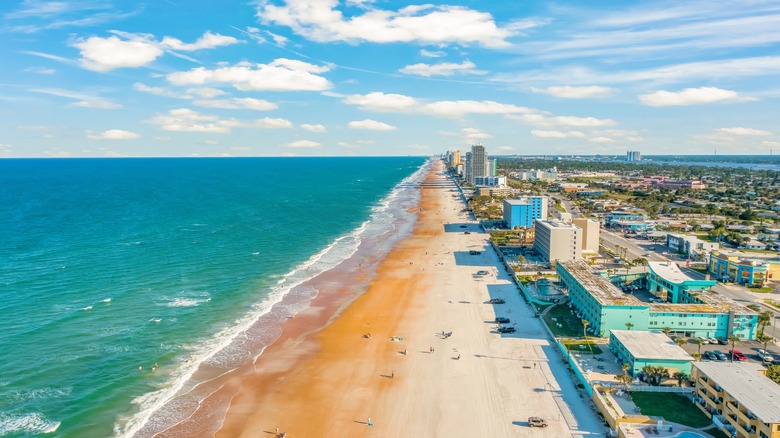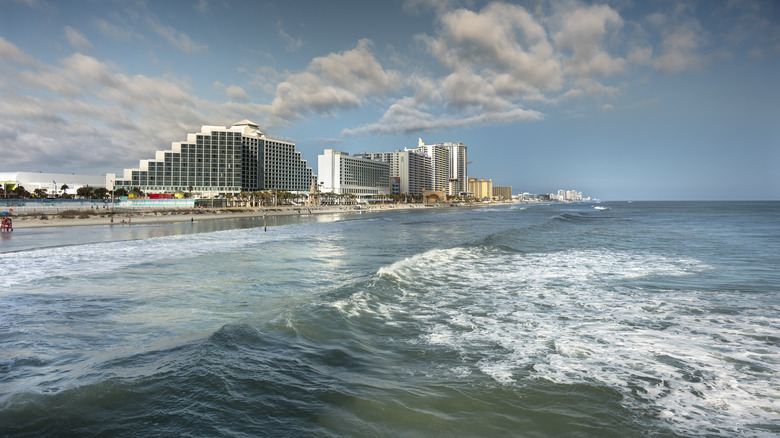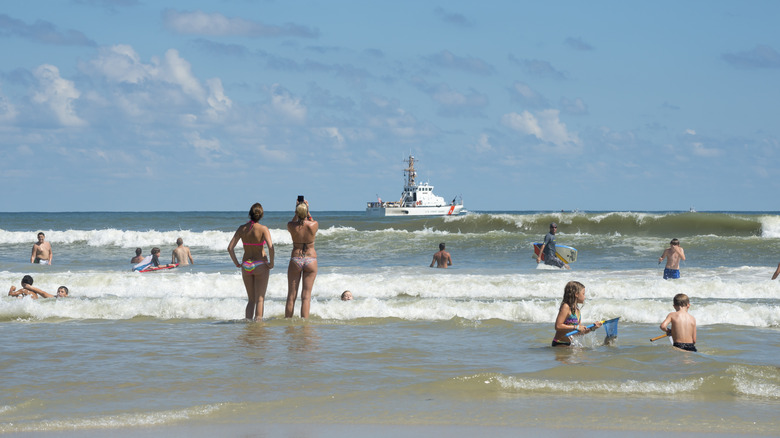Why Inexperienced Swimmers Should Avoid The Water At This Popular Florida Beach
When planning a beach getaway, it wouldn't come as a surprise if Florida often comes to mind, as it boasts some of the best beaches in the United States. But while millions flock there every year, with many eager to frolic in the sun and sand, there's something visitors might want to know: Florida is also home to most of the most dangerous beaches in the country. According to a report by Simmrin Law, which examined factors like hurricanes, shark attacks, and surf zone fatalities, 24 out of the 25 most dangerous beaches are in the Sunshine State (via KTSM). One standout is Daytona Beach — often referred to as "The World's Most Famous Beach" — where a mix of shark-related incidents and surf zone fatalities creates a real challenge for swimmers, especially those who are less experienced.
Ranked third among the most dangerous beaches nationwide, Daytona Beach has seen 18 shark attacks and 44 surf-related deaths, according to the study. In 2024 alone, the National Weather Service reported over 30 surf zone fatalities in the U.S., with the majority caused by rip currents — one of which occurred at Daytona Beach. These rip currents, described by the National Oceanic and Atmospheric Administration as powerful "channeled currents of water flowing away from shore," are apparently capable of sweeping even seasoned swimmers into deeper waters. And so for those not well-versed in ocean conditions, venturing too far from shore could spell trouble.
Rip currents are notoriously common at Daytona Beach
At Daytona Beach, it's not uncommon for lifeguards to spring into action to rescue beachgoers swept away by rip currents. In July 2023, WKMG reported that 180 people were saved over the span of just a few days. Volusia County Beach Safety Captain AJ Miller explained to the outlet, "Even with those small waves, what's going to happen is a lot of what we get are people are playing and the wave comes through and kind of lifts you up, carries you out a little bit, sets you down, another wave comes through lifts you back up and carries you out further and before you know it you're where you can't touch."
Not even a full year later, in June 2024, something similar happened, as The Daytona Beach News-Journal reported that lifeguards rescued 85 people in a single weekend alone. This serves as a reminder that swimmers — especially those less experienced — should think twice before venturing too deep, or perhaps avoid the water altogether. But if you decide to take a dip, follow the City of Daytona Beach's advice to avoid going in alone and to always stay within sight of lifeguards. For added protection, they recommend wearing a Coast Guard-approved life jacket.
And if you ever find yourself in a rip current, Beach Safety emphasizes the importance of staying calm and avoiding the instinct to break free from it. "Swim parallel to the shore until you are out of the current and then swim to the shore," they said. Conversely, if you spot someone else in trouble, resist the urge to play hero. "Throw the person something that floats," they added. "Get help from a lifeguard or call 9-1-1."
Be cautious of shark activity at Daytona Beach
Daytona Beach is hardly the most dangerous shark-infested beach in the world, but the shark activity here is serious enough that swimmers, whether seasoned or not, should never let their guards down. On New Year's Day 2024, CBS News reported the sighting of a 1,400-pound great white shark near Daytona Beach. Six months later, in July, four shark bites were recorded in a span of six days, with The Daytona Beach News-Journal noting that one of the victims was a 14-year-old. Plus, in 2023, eight of the U.S.'s "unprovoked shark attacks" occurred in Volusia County, where Daytona Beach is located.
Gavin Naylor, director of the museum's Florida Program for Shark Research, attributes this to various factors: great surf breaks that lure in swimmers and surfers, and nutrient-rich waters that attract marine life — including sharks. Blacktip sharks, which are common in the area, sometimes mistake people for prey, especially in the murky waters. "High density of people, high density of baitfish, low visibility, and a lot of sharks that are hungry and looking for their lunch," they explained to the outlet. "So the confluence of all those factors makes (Volusia) sort of a shark attack capital of the world."
To reduce your risk of being a shark's meal, Naylor advises ditching shiny jewelry that can catch a shark's eye and avoiding areas with fishermen or baitfish. And whatever you do, don't swim alone or at dusk. Neil Hammerschlag, director of the Shark Research and Conservation Program at the University of Miami, also recommends trusting your instincts. "Probably the most important thing is to follow your gut," they told CNN. "If you feel wary about getting in the water... just don't go in the water."


